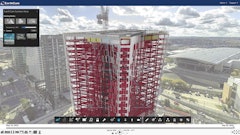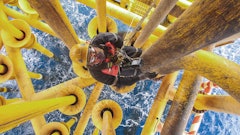Every contractor wants teamwork! I've never worked with a contractor yet who believes that having each employee work independent of other employees is the key to their company's success. Yet so many contractors do very little to promote and encourage real teamwork.
Admittedly, teamwork is part "natural" and part "formula" driven. By "natural" I mean that there might be some qualities employees possess - that weren't taught - that are positive and appreciated. A "natural" might include a crew of five workers where one worker is a self-starter, a second worker is detail oriented, a third is especially focused on quality, the fourth might be a clean freak, and the fifth employee in this puzzle might like to analyze the big picture before jumping in unprepared. Putting this group together, with the right encouragement, could produce a very productive and positive crew with each worker contributing something unique and proactive.
Unfortunately most crews do not simply materialize like this, which leads us to the need for a formula-driven strategy. Let's look at three essentials of building teamwork at your pavement maintenance business.
1. Recognize each employee's strengths & weaknesses. You can't begin to put a team together unless you totally understand each employee's strengths and weaknesses. This recognition is just as important in the "natural" approach but is paramount to putting a real team together. Part of this recognition is also realizing that not all strengths work well together. For example, if you have a headstrong employee on the same crew with a very driven employee you're going to have some internal issues. The driven worker will most likely butt heads with the headstrong. In my experience, the driven worker is often more vision oriented, wanting to reach whatever goal the owner has set. The hardheaded employee may be fine as long as the actual work stays within the boundaries of what he knows. Once the work falls outside this boundary, watch out.
So, recognizing each worker's individual strengths and weaknesses must be embraced and then acted on to building the right team. Can you have too many of one strength or trait? Yes! And if you do, you need to seriously consider separating the sameness, developing another crew, or simply doing without one individual. This can be tough, especially if the duplicate trait employees have some other skills that could be helpful.
2. Keep the employee's focus on goals (short & long term). I have found that even the most dysfunctional crews can still produce acceptable work, maybe even exceptional on occasion, if they are "brainwashed" with the daily, weekly, and seasonal goals. Building consistency in your quality and profits means that you keep your employees focused on what is critical to success - yours and theirs. If you are simply having your workers show up each day without a clear picture of what is important for the day or how that day's efforts feed into the week's goals you will not reach needed levels of performance.
Don't overlook the power of goal setting. It's an old "basic" that continues to be forgotten and not effectively utilized. Set the goal and you have an easier time moving the workers in one direction. Fail to set goals and prepare to feel like you are trying to corral a bunch of cats.
3. Get personally involved with team members. If you thought that perhaps I was going to include paying bonuses you would not be totally wrong. Money is important, especially if you can reward the team monetarily. But my final essential still falls back on the owner or senior leader. In all of my travels and consulting with some of the finest pavement maintenance leaders in the industry, I'm still amazed how much influence the owner/senior leader has on workers if he is personally involved.
Talk with each worker periodically throughout the week, and don't leave anyone out. No matter if the person is your most valuable worker or the newbie who doesn't understand the difference between asphalt and concrete, visit personally with each one. Get to know their personal life and address some of those facts. What are their interests? Are they married? Do they have kids?
Don't continue to want teamwork within your business - determine now that you are going to build it if it is not already present. It's not only possible to build teamwork in your business but it could also be a reason why your business could see another 3%-5% profit!



























